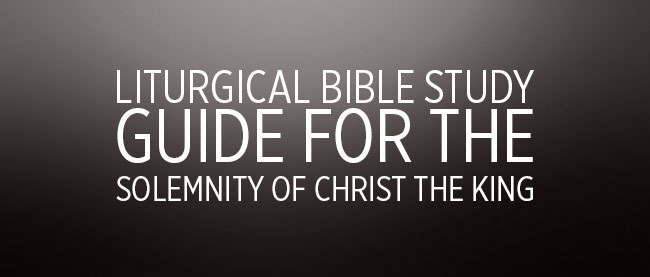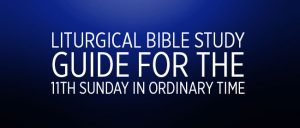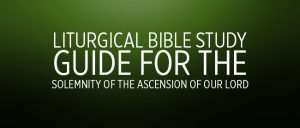Introduction
Instituted by Pius XI in 1926, this feast was celebrated on the last Sunday of October to foster the awareness of Christ’s dominion over all people and to establish peace among nations. After Vatican Council II the feast was transferred to the last Sunday of the Liturgical Year, the Sunday before Advent, on which the human race is consecrated to the Sacred Heart through the Litany of the Sacred Heart and a prayer recited before the Blessed
Sacrament.
This feast celebrates Christ’s Kingship in an altogether non-worldly way. Jesus was anointed by the Father with the oil of gladness as the Eternal Priest and Universal King. As Priest He offered His life on the altar of the Cross and redeemed the human race by this one perfect sacrifice of peace. As King He claims dominion over all creation that He may present to the almighty Father a Kingdom of truth and life, a Kingdom of holiness and grace, a Kingdom of justice, love, and peace.
1st Reading – Ezekiel 34:11-12, 15-17
It is Ezekiel who pronounces the death sentence upon the kingdom with its entire political and religious structure of king, priest, and prophet. The earliest date mentioned in his book is 593 B.C. and the latest is 571 B.C. He was one of those deported by Nebuchadnezzar to Babylon in 597 B.C.
The book of Ezekiel falls into four major parts:
1) Chapters 1 through 24 which are threatening discourses before the fall of Jerusalem
2) Chapters 25 through 32 which are oracles against the nations
3) Chapters 33 through 39 which contain discourses of promise after the fall of Jerusalem (from which our reading for today comes)
4) Chapters 40 through 48 which are descriptions of the future restoration of the Temple, Jerusalem, and Israel
It is interesting that St. Jerome, in his preface to the book of Ezekiel notes that rabbinic tradition was that no one was permitted to read the beginning and the end of the book (also the beginning of Genesis and all of the Song of Songs) until he reached the age at which priests began their ministry (age 30) because “full maturity of human nature is necessary for perfect knowledge and mystical understanding” such as are called for by the material in these passages.
The 10 verses preceding today’s reading are a bitter indictment of the wicked shepherds of God’s people. In today’s reading we hear Yahweh proclaim that he will judge between the sheep and inaugurate an age of peace.
2nd Reading – 1 Corinthians 15:20-26, 28
In Paul’s day Corinth was a bustling city with a cosmopolitan population drawn from all parts of the Roman Empire. It was a center of government and of commerce; its population included Roman officials and military, businessmen, merchants, and sailors from Greece, Italy, Syria, Palestine, Egypt, and other parts of the empire. The city was also famous as a sports center. It was the home of the Isthmian games celebrated every second spring. Athletes from all of Greece and the empire flocked to Corinth to compete in these contests. In a pagan world notoriously tolerant of sexual license, Corinth had a reputation for debauchery and licentiousness. In the Greek language, “to live like a Corinthian” meant to live a dissolute life. Also, the expression “Corinthian girl” was a euphemism for a prostitute. The patron deity of the city was Aphrodite, whose temple is said to have been serviced by a thousand priestesses, who were sacred prostitutes.
Against this background, Saint Paul established the Church in Corinth in early A.D. 51 and eighteen months later left there a flourishing community of Jewish and Gentile converts.
This letter to the Corinthians is the second of four, two having been lost. In it Paul addresses disorders in the Church and provides answers to questions they have posed to him in a letter.
Gospel – Matthew 25:31-46
This parable has no parallel in the other Gospels, it is unique to Matthew. It follows immediately after the parable of the talents which we heard last week.





